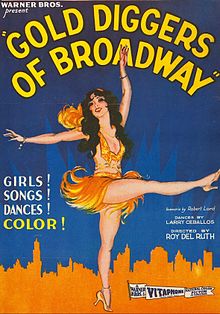| Gold Diggers of Broadway | |
|---|---|
 theatrical release poster | |
| Directed by | Roy Del Ruth |
| Written by | Robert Lord (scenario & dialogue)[1] De Leon Anthony (titles)[1] |
| Based on | The Gold Diggers (1919 play) by Avery Hopwood |
| Starring | Winnie Lightner Nick Lucas |
| Cinematography | Barney McGill Ray Rennahan (Technicolor) |
| Edited by | William Holmes |
| Music by | Joseph Burke (music) Al Dubin (lyrics) |
Production company | |
| Distributed by | Warner Bros. Pictures |
Release dates |
|
Running time | 105 minutes[1] |
| Country | United States |
| Language | English |
| Budget | $532,000[2] |
| Box office | $3,967,000 (worldwide rental)[3] |
Gold Diggers of Broadway is a 1929 American pre-Code musical comedy film directed by Roy Del Ruth and starring Winnie Lightner and Nick Lucas. Distributed by Warner Bros., the film is the second all-talking, all-Technicolor feature-length film (after On with the Show!, also released that year by Warner Bros).
Gold Diggers of Broadway became a box office sensation, making Winnie Lightner a worldwide star and boosting guitarist crooner Nick Lucas to further fame as he sang two songs that became 20th-century standards: "Tiptoe Through the Tulips" and "Painting the Clouds with Sunshine".
Based on the 1919 play The Gold Diggers[4]—which was also turned into a silent film of the same name in 1923—Gold Diggers of Broadway utilized showgirls, Technicolor, and sound as its main selling points.
It was chosen as one of the ten best films of 1929 by Film Daily. As with many early Technicolor films, no complete print survives, although the last twenty minutes do, but missing are a bridging sequence and the last minute of the film. Contemporary reviews, the soundtrack and the surviving footage suggest that the film was a fast-moving comedy which was enhanced by Technicolor and a set of lively and popular songs. It encapsulates the spirit of the flapper era, giving a glimpse of a world about to be changed by the Great Depression.
Because Gold Diggers of Broadway has been considered a partially lost film since the 1970s, the loose remake, Gold Diggers of 1933, is the most frequently seen version of the story.
- ^ a b c d Cite error: The named reference
afiwas invoked but never defined (see the help page). - ^ Glancy, H Mark (1995). "Warner Bros Film Grosses, 1921–51: the William Schaefer ledger". Historical Journal of Film, Radio and Television. 15: 55–73. doi:10.1080/01439689500260031.
- ^ Warner Bros financial information in The William Schaefer Ledger. See Appendix 1, Historical Journal of Film, Radio and Television, (1995) 15:sup1, 1–31 p 10 DOI: 10.1080/01439689508604551
- ^ IBDB The Gold Diggers